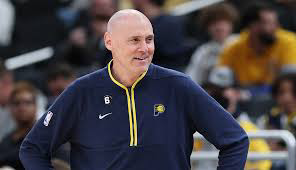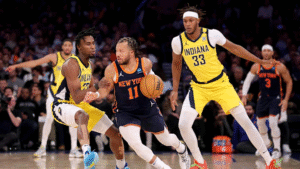
The Departure That Shook Indiana: Jalen Brunson Reacts to Myles Turner’s Move to the Bucks
In what has become one of the more unexpected offseason narratives in recent NBA memory, Myles Turner’s departure from the Indiana Pacers has sent ripples through the league—none louder than the reaction of Jalen Brunson, the New York Knicks’ All-Star point guard. Speaking on an episode of his podcast, Brunson openly questioned the circumstances of Turner’s exit, describing it as surprising and abrupt. His comments have sparked further conversation not only about Turner’s value and role with the Pacers, but also about how the NBA handles loyalty, long-term commitments, and roster reshaping in today’s rapidly shifting landscape.

Brunson, known for his articulate takes and thoughtful analysis both on and off the court, didn’t hold back. “I thought the Myles Turner thing was weird,” Brunson commented on his show, clearly taken aback by how events unfolded. “Like he just said, ‘It’s been a decade here,’ and all this stuff and everything, and then, boom, gone.” His words reflected a shared sentiment among many fans and league insiders who saw Turner not just as a core piece of the Pacers’ identity, but as a figure of loyalty and consistency in an ever-changing NBA.
Indeed, Turner’s journey with the Indiana Pacers was more than just a professional stop; it was the foundation of his basketball identity. Drafted 11th overall in 2015, Turner spent nine full seasons with Indiana. During that time, he developed into one of the league’s premier shot blockers and defensive anchors. His ability to space the floor on offense and protect the rim on defense made him a unique commodity in today’s NBA. But more than his statistics or skill set, it was his presence, leadership, and quiet consistency that defined his time with the Pacers.
So when Turner agreed to a four-year, $108.9 million contract with the Milwaukee Bucks this offseason, the move stunned not only fans in Indiana but even fellow players around the league. The Bucks, already a perennial Eastern Conference powerhouse, solidified their frontcourt depth with the acquisition, adding Turner to a roster that features two-time MVP Giannis Antetokounmpo and All-Star Damian Lillard. Turner’s signing sent a strong signal that the Bucks are all-in on chasing another championship. But for Indiana, it marked the end of an era.
The Pacers’ Next Steps: Replacing Turner
In the immediate aftermath of Turner’s departure, Indiana acted swiftly, acquiring center Jay Huff from the Memphis Grizzlies. Though not as accomplished as Turner, Huff is considered a promising young big man with potential upside, particularly as a rim protector and pick-and-roll defender. The Athletic, in a post-offseason analysis, applauded the Pacers’ front office for making a savvy and strategic move, calling the acquisition of Huff one of the more underrated transactions of the summer. They commended Indiana for addressing a gaping hole quickly and efficiently without overcommitting financially or disrupting their long-term plans.
Still, for many, this change felt like a downgrade. While Huff may be a solid rotation piece, he lacks Turner’s star power and long-term résumé. The Pacers will now have to recalibrate their defense and locker room dynamic without a player who was a fixture for nearly a decade.
Rumors, Disrespect, and the Market Value Debate
Turner’s name has been frequently mentioned in trade talks over the last several seasons, with teams like the Lakers, Warriors, and Hornets reportedly expressing interest at various points. Despite his proven value as a modern-day stretch five, Indiana seemed reluctant to either trade him outright or offer him a deal reflective of his market worth. This hesitation created a sense of friction between the organization and Turner’s camp, a dynamic that ultimately may have played a part in his decision to leave.
An unnamed NBA agent, speaking to Matt Siegel of HoopsHype, offered a damning perspective on the situation. “I’m not really sure why the Pacers always undervalued him,” the agent said. “He played below his market value on his last contract, and they expected him to take another cut this time around because they clearly didn’t want to go into the tax? This was shocking. We didn’t expect Myles’ leaving to even be a discussion this summer.”
The comments suggest that behind the scenes, Turner may have felt underappreciated—financially and personally. Despite being one of the league’s best shot blockers and a team captain, Turner never quite received the financial or cultural commitment from Indiana that other franchise pillars enjoy. The Pacers, long known for their cautious approach to spending and a resistance to entering the luxury tax, may have prioritized flexibility over loyalty.
A Decade of Dedication
The idea of loyalty in professional sports has always been complicated. Players who commit to a franchise for nearly a decade—especially without a championship or consistent playoff success—are often seen as anomalies in today’s NBA. Turner, for much of his tenure, fit that mold. He played hard, remained humble, and spoke highly of Indiana both publicly and privately. So it’s no surprise that Jalen Brunson and others found his departure jarring.
The phrase “it’s been a decade” carries emotional weight. Turner wasn’t just acknowledging a milestone; he was expressing a connection that many assumed would last until the end of his prime playing years. In that context, his exit—no matter how lucrative or strategic—feels like a break from the norm.
And yet, professional sports is a business. Turner’s move to the Bucks isn’t just about a paycheck. It’s about competing at the highest level, chasing a championship, and playing alongside superstars in a city where winning is the expectation. Milwaukee presents a different opportunity—one Indiana couldn’t match, especially after years of underachievement and front office reshuffling.
Brunson’s Commentary: A Mirror to the League
Brunson’s reaction is worth deeper analysis not only because he’s a respected All-Star, but also because it reflects a growing conversation among players about loyalty, communication, and how franchises treat their veterans. His “boom, gone” phrasing captures the suddenness of Turner’s departure, but also reveals a sense of disorientation among players who see their peers leave situations that, on the surface, seemed stable.
Brunson, who himself made a highly scrutinized move from the Dallas Mavericks to the New York Knicks in 2022, understands the nuances of player movement. But in this case, his surprise wasn’t about Turner taking a bigger deal—it was about the gap between what was said and what actually happened. Turner’s comments about Indiana being home, about a decade-long connection, about growing with the team—all of it seemed to suggest a long-term future. And then, without much warning, he was gone.
It raises questions about transparency in player-franchise relationships. Did Turner feel pressured to say the right things publicly while negotiating his exit behind closed doors? Did Indiana mislead him about their intentions? Or did the Bucks simply offer an opportunity too perfect to pass up?
The Bigger Picture: NBA Player Movement and Loyalty
In the modern NBA, movement is inevitable. Superstars change teams with regularity, often in pursuit of a better roster fit or championship contention. But Turner wasn’t a restless superstar. He was a defensive specialist, a fan favorite, and a steady veteran presence. His departure signifies that even the most grounded players are reevaluating their futures in real-time.
Front offices must now contend with this new reality. It’s not just max players who are willing to walk—it’s the loyal soldiers, the foundational big men, the long-time locker room leaders. If those players don’t feel respected or properly compensated, they will leave. And when they do, as Brunson pointed out, it can feel like a betrayal of what fans and teammates thought was a shared understanding.
What’s Next for Turner and the Bucks?
With Milwaukee, Turner enters a championship-caliber environment where his skills can be maximized. He won’t be asked to carry the offensive load, but he will be expected to anchor the defense, stretch the floor, and play high-IQ basketball. Surrounded by elite talent, Turner will finally have the chance to showcase his abilities on the biggest stage—deep into the playoffs.
The Bucks are betting that Turner’s combination of size, skill, and experience will help them compete against other Eastern Conference giants like Boston, Miami, and Philadelphia. And for Turner, the move represents a shift from patience to urgency—a transition from a rebuilding team to a title contender.
What Does This Mean for Indiana?
For the Pacers, the post-Turner era begins with uncertainty. While young stars like Tyrese Haliburton and Bennedict Mathurin offer hope for the future, the loss of a defensive centerpiece creates challenges on both ends of the court. Jay Huff might help in spot minutes, but it’s unlikely he replicates Turner’s two-way impact anytime soon.
Additionally, the team must address the perception that it undervalues its players. If agents and players believe Indiana is unwilling to pay fair market value, future free agency conversations may be more difficult. In the ultra-competitive NBA landscape, reputation matters.
The Verdict: A Quiet Exit With Loud Implications
Myles Turner’s departure may not have included fireworks, but its aftershocks are still being felt across the league. For a player who spent nearly a decade building something in one city, leaving so abruptly—even for the right reasons—feels poignant. It reminds us that no matter how strong the bond between a player and a franchise may seem, the business side of the NBA always looms large.
Jalen Brunson’s candid response encapsulates the collective disbelief many are feeling. The NBA is a league in flux, where long-standing commitments can unravel in an instant, and where even the most loyal players have to think twice about their futures.
Turner now turns the page to a new chapter with the Bucks. The Pacers, meanwhile, must move forward without their longtime anchor. And the league? It watches closely, reminded once again that in the NBA, nothing is ever guaranteed.
Leave a Reply